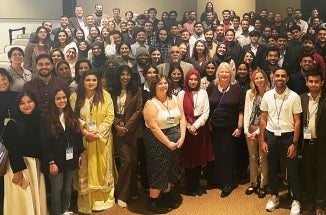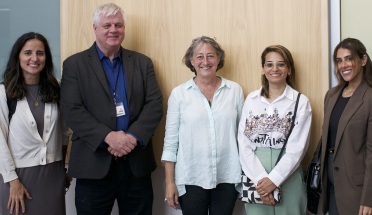
Anthropology Professor Advocates for Fulbright Pakistan Scholars
- Jan 21, 2025
- Global Customized Programs
- by Ellen Stader
In 2024, The University of Texas at Austin hosted 117 Fulbright Scholars from Pakistan on the Forty Acres for a seminar designed to bolster their academic and professional development. The seminar addressed issues affecting society and academia in the United States to help the cohort better comprehend the context in which they will live and study, preparing them for greater success while in the U.S.
Professor Kamran Ali’s first job was to inspire and connect with these visiting scholars. As keynote speaker at November’s welcome gathering for the Fulbright Pakistan Student Seminar, he did exactly that.
“What do we get when we come to the United States and pursue a broad-based liberal arts degree?” Ali asked the assembled cohort during a keynote address focused on the distinctive nature of higher education in the U.S. "The idea is to expose Fulbrighters to various aspects of American cultural practice."
Fulbright Pakistan Student Seminar
Sponsored by the United States Education Foundation in Pakistan and the U.S. Department of State Bureau of Educational and Cultural Affairs, the Fulbright Pakistan Student Seminar benefits Pakistani Fulbright scholars enrolled in their first year of master’s or doctoral programs at universities in the U.S.
The scholars attended a leadership workshop and numerous sessions focused on the history and culture of social movements in the U.S. as well as academic norms for the humanities and sciences, also enjoying cultural enrichment excursions to the Texas Science and Natural History Museum and Harry Ransom Center.
“I've kept in touch with a lot of those students and seen them progress,” said Ali, citing happenstance encounters over the years with former program participants furthering their studies or teaching at universities in Pakistan and other countries. “That's been heartening, to see that the Fulbright program is giving opportunities to young scholars — and they’re taking it one step further, finishing their Ph.D.’s or using their master’s degrees productively, either in the United States or in Pakistan.”
In total, 117 participants attended the Fulbright Pakistan seminar on the Forty Acres in 2024, representing 63 universities across the U.S. Hosted by the Global Customized Programs unit at Texas Global in collaboration with the Institute of International Education, the attendees included 10 mentors, themselves former Fulbright Pakistan Student Seminar participants, now in their second year of the Fulbright program or beyond.
"Fulbright strives to build lasting connections for a more peaceful world, and programs such as the Fulbright Pakistan Student Seminar do just that,” said Caroline Hoffman, team lead for Global Customized Programs. “Exchange programs like this are critical to helping us understand one another, think from multiple points of view, and reinforce the importance of international education."
A Career in Cultural Anthropology
While earning his bachelor’s degree in medicine at the University of Karachi in his native Pakistan, Ali felt himself drawn to aspects of study that he described as medical anthropology, focusing on public health and social determinants of access to care including socioeconomic class, poverty and deprivation.
He explored how social issues of homelessness, inadequate access to proper nutrition or an inability to afford housing translated into systemic health issues. This orientation toward public health led him to a pivot in his next endeavor, as he preferred anthropology’s focus on “how people live, what they care for, what kinds of social systems they form.”
“I had the opportunity to apply and get into Johns Hopkins in anthropology,” said Ali. “They have a very strong public health program. I also had mentors who were doing work around reproductive health and gender and health issues. I was thinking about a public health degree affiliated with the social sciences, but then it became focused on anthropology.”
Thus began Ali’s training as a cultural anthropologist. At Johns Hopkins, he wrote a dissertation on rural and urban Egypt, eventually training his focus on the Middle East and South Asia, specifically Egypt and Pakistan. He also conducted research in Mexico, taught at the University of Rochester and spent a year in El Salvador working for the United Nations as a human rights monitor. He came to Austin to teach anthropology and Middle Eastern Studies at UT in 2001.
South Asia Institute
Now a professor of Middle Eastern and Asian Studies as well as department chair in the Anthropology Department at UT's College of Liberal Arts, Ali maintains an extensive body of written work, with six single-authored and edited books published in English and several translated works from Urdu, some with the aid of Texas Global grants.
Connections across campus and the world have led Ali to ever greater opportunities to study, teach and serve. He has long been a beacon not only for UT students studying South Asia and related regions, but also for scholars from Pakistan, especially during the six years he served as the director of the South Asia Institute, 2011-2017.
“[While I was] the director of the South Asia program on campus, we received three major grants from the United States Department of State for collaborative work with Pakistani universities,” said Ali. “One is a women's university in the city of Rawalpindi; another a film program in Lahore; and another music and theater program in Karachi.”
For three years, the federal grants allowed the South Asia Institute to bring scholars and junior faculty from the Pakistani women's universities to the UT campus for a semester of professional education under the guidance of senior faculty.

"Over three years, we brought 23 or 24 faculty or junior faculty here for a semester,” said Ali. “[We] had them mentored by senior faculty members to help them develop their research projects or curriculum, gave them exposure to different kinds of course development. Then, faculty from UT would go to their universities and for two weeks give seminars on research, course development, presentation and writing.”
Addressing Higher Education
Arising from these interactions with the South Asia Institute, Ali’s colleagues at Texas Global began inviting him to speak to and meet with visiting Fulbright Pakistan scholars.

In 2023, Ali welcomed the Pakistani Consulate General at the Pakistan Fulbright welcome event. In 2024 he gave his first keynote address, which touched on the benefits of critical and creative thinking complemented by academic freedom in a humanistic, liberal arts education.
“I was talking to [the scholars], and one of the things that they distinctly mentioned learning is that the American higher education system allows them much more freedom to express themselves, and also a certain kind of a democratic ethos,” said Ali.
Fulbright Pakistan 2024 mentor Anum Naseer, currently studying at the Rhode Island School of Design Graduate Program, shared similar sentiments.
“I came to the U.S. on a Fulbright program to pursue an MFA, and being here has led me to be very inspired by the people around me and the stories and narratives they're bringing with them here in the U.S.,” said Naseer. “I think in Pakistan, there are lots of opportunities to learn, but the resources and information, and the connections you can make in the U.S. — because of how diverse and how big it is — are unmatched.”
Maintaining Global Connections
Ali’s speaking engagements aimed at the entire cohort have often resulted in personal acquaintances between visiting Pakistani scholars and the Longhorn faculty member.
“I would always come and meet with the students,” Ali said. “It's just a matter of what I do and the opportunities I've had, and linking up with people.”
Ullah Rizwan, a Fulbright Pakistan 2024 participant studying at Purdue University Graduate School, most enjoyed this networking aspect of the seminar.
“I’m always excited to share my experience with others, and excited to see what other people are doing in their fields,” said Rizwan. “Whenever I get together with people from different domains — from humanities, from engineering, from the sciences — always their projects give me a confidence in our country's people, specifically Fulbrighters. They are putting in such good things to make our country back into our dream country.”
Ali often finds himself inspired by such reflections, rejoicing in the scholars’ continued aspirations and achievements and offering help where he can.
“Many of these students, after they did their master’s, would continue in their doctoral work, and now they are junior faculty,” said Ali. “I remain in touch with them. Some of them, I've even persuaded to publish in various publications in which I'm a contributing editor or have come out with a special issue of a journal.”
Expanding Perspectives via Exchange
The educational and cultural benefits for participants of Fulbright Pakistan are clear, and no less for program mentors like Sidra Tariq, a Fulbright Pakistan 2024 mentor from the University of Michigan-Ann Arbor’s Rackham School of Graduate Studies.
“What brings me back here, other than the hospitality of UT Austin, is to listen to stories of different people from all around Pakistan and all around the United States — different perspectives, different cultures, different programs,” said Tariq. “This is the motivation that I always feel to come back to UT Austin for the Fulbright Pakistan program.”
These effects are also mirrored and augmented by the benefits that visiting scholars bring to those they meet during the program, including fresh mindsets and innovative approaches arising from unique experiences in other countries and cultures.
“While participants come and learn about U.S. history and culture on our campus, UT Austin faculty and staff also report how engaging with Fulbrighters has shifted their perspectives and made an impact on their teaching and professional work,” said Hoffman.
Ali cited such connections with several Fulbright Pakistan participants, which have given him a unique view on the inventive outlooks that international scholars offer.
“That, I think, is much of the way that innovation happens in U.S. academia: exposure to a broader set of perspectives coming from minds from all over the world,” said Ali. “That's why the American university is so successful in producing ideas — whether in the sciences, social sciences or humanities — that are unique and important.”
And in return for these contributions, Ali concluded, “What we can learn depends on how much we listen to them.”



